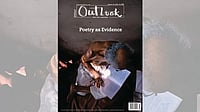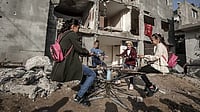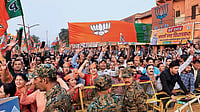
Our First Bouquet
December 06, 1995
Your newly launched journal is commonsensical, witty and iconoclastic without being crude and blasphemous. The language is excellent and crisp, your statements telling and hard-hitting. The article on tourism in Goa had a good sense of line. It was crisp and lively, with a flashy beginning and a snappy conclusion. The trenchant conciseness of its diction particularly appealed to me. Vivid clarity is the rule right through, I note. Ergo, it is refreshing and easy to read Outlook.
P.R. Narayanan, Panampilli Nagar, Cochin
April 28, 2003
I was one of the few Americans who was against the war. But I was outnumbered. By one man. George Bush. Several hundred thousand people around the world said ‘No’ to war. One man, George Bush, said ‘Yes’. And we couldn’t stop him. I’m sorry for the impression this must have given of Americans. I sent an e-mail to one of my senators about being against the war. There was no reply. Not even an auto-reply. You see, being against the war’s like criticising your mum’s cooking; even if you’re right, you’re frowned upon because you’re “unpatriotic”.
John Briggs, Missouri, US
January 21, 2002
The next meeting between the NSCN(IM) leaders and the Indian diplomats may as well take place on the Moon, the ISS or even on Mars; and not only in Osaka, Bangkok or Zurich. If the leaders on both sides are really serious about solving the problem, they should shift the venue of their next rendezvous to Nagaland and involve other Naga leaders—the church and Hoho leaders, NSCN(K), NNC, student and women leaders, NGOs and local government functionaries—in talks. Only such an exercise can help in identifying the needs of Naga society.
Luther P. Naga, on e-mail
March 8, 1999
Why do you pick on us? We tribals have always been easy targets for people who for their own vested interests try to portray themselves as our well- wishers and sympathisers. Recently, headlines of various leading newspapers were screaming about some 200 tribals being reconverted to Hinduism. The question is not about conversions, but about our welfare. My question is to those who, to exploit the prevailing inflammable issue of conversions, dare to come down to us at the grassroots, publicise their activities and use us. Why don’t you fight for our social rights, work towards our upliftment, help us get better education and healthcare with the same zeal you show on the issue of conversions?
Anurag Tuti, New Delhi
December 03, 2001
Arundhati Roy is a fine novelist, an elegant essayist, an admirable champion of free speech and a sloppy historian. In her essay War is Peace, she lists 19 countries with which she alleges the US has been “at war—and bombed—since World War II”. She’s wrong about eight of them. For the record, the US has never been at war with—let alone bombed—China, Indonesia, Guatemala, Cuba, Congo, El Salvador, Peru or Nicaragua. The behind-the-scenes US record in these and other countries richly deserves cold-eyed reappraisal but loose, overheated language like Roy’s only makes that vital task more difficult.
Geoffrey C. Ward, New York
April 30, 2001
If it’s any comfort to Sagarika Ghose (Delhi Diary), there are two other countries, besides ours, that have an American fixation. For all the noise the French make about their art, culture and language, they can still go ga-ga over French spoken with an American accent. Closer home, Singaporeans with all their achievements and proud Chinese lineage still look up to the white man. For their women, American men top the list of being the most desirable. Poor Chinese mainland men come last.
Nandini Bahri-Dhanda, on e-mail
Mar 13, 2000
Mark Twain once happened to visit Varanasi where a devout Hindu exulted about the holiness and purity of the Ganges. His nostrils suffocating from the stench of the floating carcasses, Twain quipped that no decent germ could afford to stay on in the river. And that is the river Deepa Mehta is being accused of polluting?
K.R. Rangaswamy, North Carolina

The Outside View
March 18, 2002
I’m a French national residing in Mohammedpur, a small (predominantly Hindu) village in south Delhi. A number of Islamic monuments from the pre-Mughal era, mostly tombs, stand in and around here. Some days ago, a disused mosque, dating back to the Lodi dynasty, was pulled down here, probably for construction use. As I write this letter, the rubble is being carried away. Soon all traces of that historical building will have been obliterated forever.
Francois Xavier Durandy, New Delhi
April 30, 2006
As a frequent traveller to India, I’d have to agree that India is simply incredible (Ambika Soni interview). But to attract a larger share of the world tourist market, her ministry is going to have to go a lot further than slick marketing campaigns and sprucing up heritage monuments with private sector money. India’s international gateways—its airports—are an embarrassment; they’re the shabbiest, least efficient I’ve ever had to endure, and invariably an unpleasant shock for the nervous first-timer. All travellers have also heard stories about taxiwallahs who take you hostage to a hotel in the middle of nowhere and demand extortionate sums. Surely, it is not beyond the wit of India’s tourism ministry to establish decent public sector airport shuttle buses tourists can trust. It would make a huge difference to our peace of mind—and to the wallets of the millions of honest Indians working in the industry.
Dr Katherine Brown, Leeds, UK
January 10, 2005
How is it that ‘India’s largest sex survey’ only discusses typical gender identities and hetero-normative behaviour? Are we to believe that a survey which covers 15 states, 15 years, and over 15,000 people from ages 19 to 90, found no case of gay, lesbian, trans- or bisexual behaviour? Ignoring alternate sexualities in India undermines the case for repealing Sec 377 of the ipc; it also undermines the fight against hiv; and at the “personal” level it leads the individual who has a different sexuality into believing that he or she is alone and has a pathological sexuality or persona. The truth is that we exist and we are “normal”; we could be part of your family, but if you ignore our reality and our existence, then how can we ever build an authentic, meaningful relationship with you?
Aprotim, Hari, Manish et al, Good-As-You, Bangalore
October 30, 2000
In your feature ‘C.P. Surendran Dines Ashok Row Kavi’, there is a sentence—“Ashok talks about how half the world is grey.” Ashok didn’t say it. I didn’t write it either. What I wrote was, “Ashok talks about how half the world is gay.” Gay as in homosexual.
C.P. Surendran, Mumbai
February 19, 2007
It’s appalling that you should suggest smoking isn’t all that bad. You even go to the extent of insinuating there’s no evidence to prove its ill-effects on health. Ridiculous! The hazards of tobacco—and of being a passive smoker—are well documented in literature researched and published by organisations right from the who. European and American lawmakers are concerned about the costs of smoking—not just in terms of public health, but the manhours of work lost due to illness. Even France and Germany are waging a tough anti-cigarette battle since smoking in these countries is culturally equated with the good life. Washington DC, the capital of a free country like the US, is now a smoke-free area. Surely, it can’t be because smoking is considered ‘Third World’ that it’s becoming unfashionable in India?
Aparna Sundaram, Washington
April 14, 2003
I am greatly flattered that you should refer to our country as a superpower. India were outplayed on the day and that is a shame for them. But I do feel for the Indian cricket fans. In Australia, we take our cricket seriously but not to the level of the Indians. Nonetheless, I was impressed by the fight put up by the Indian team and was nervous till the 25th over.
Chris Beitzel, Canberra, Australia
January 26, 2009
Your account of madrassas in Jaunpur and Azamgarh made for interesting reading. But let’s not get into this habit of attributing everything of this nature to Hindu-Muslim amity and peaceful coexistence. There is more to the story. Jaunpur has been a literary centre, and traditions such as the one you report on are a reflection of the region’s rich history of learning and interaction between cultures that created spaces for scholarly engagement. My grandfather read the Bhagavat of Sankaradeva, written in an old form of Assamese. He read the Quran in Arabic. This was not about Hindu-Muslim relationship: he did it because he followed a tradition of learning. He did not have to work on unity and tolerance. It existed in him as a norm.
Kazu Ahmed, on e-mail

The Letter That Wasn’t
October 30, 2000
Jewish religion predates Islam. And Jews are not known to have destroyed others’ religious places except in Biblical times. So clearly the Islamic al-Aqsa mosque was built in provocative proximity to the Jewish Temple Mount, if not directly on top of it. When two days back I saw a bunch of Palestinians converting the Jewish site into a mosque and painting it green, I felt as I was seeing history. This is exactly how Ayodhya and thousands of other Hindu temples were razed and converted into mosques!
Tunku Varadarajan, New York
Corrigendum The above letter received by us on e-mail and carried in the name of Tunku Varadarajan was a hoax. We apologise for any embarrassment caused to Mr Varadarajan.
November 10, 2003
Thanks to a friend who slipped Outlook into my bag as I left Delhi, I was brought up sharp to the reality of insurgency in so many states. My complaint is how briefly you treat them—and in so doing perpetuate the idea that these are small wars, easily understood, that can be dismissed by mainstream India. Those of us who love India long for the day its tribals/marginalised will be respected and celebrated. Then only can the cycle of exclusion/repression, leading to the wish to secede, be broken.
Marcus Thompson, Oxford, UK
December 24, 2001
Outlook’s hatchet job on Mike Denness has a historical precedent. In 1778, Boswell asked Dr Johnson the cause of why “subordination is badly broken down in this age”? Dr Johnson’s reply: “Why, the coming of the Scotch!” Cricket should be left to Yorkshiremen and pantheists.
Bill Aitken, New Delhi
August 3, 2009
Apropos of Malavika Sangghvi’s Stratospheric Chic, I once used to work for ExxonMobil India and did the Bombay-Delhi-Bombay round-trip frequently. An all-expenses-paid trip, I’d usually travel business class. On one occasion, I had the pleasure of having onscreen villain Amrish Puri sitting next to me. Still young, I could not hide my awe of him. Puri had once visited an Indian Oil depot where his younger brother used to work. I too was there that time. Recalling the occasion, I felt a strange feeling of warmth towards the actor and offered him a warm ‘hello’. He looked away with disdain. I was quite crushed. Travelling in the same plane was P. Chidambaram. When the plane landed at the Delhi airport, PC started walking down the aisle. Puri, on seeing him, removed his hat and bid him a dramatic ‘Good morning, sir’. Chidambaram walked past, without even giving the actor a second glance. My mood lifted immediately, as if justice had been done. I, a cattle class, always felt comfortable in the company of crown princes thereafter.
Sudhir Kumar Bisht, Delhi
February 21, 2005
As a foreign backpacking tourist, I enjoyed reading Larry Jagan’s piece, Beaches of Sin. But as someone genuinely interested in India, I feel obliged to point out that what has happened in Thailand is now starting in India as well. Big companies have caught the smell of money and begun catering to richer tourists, thus inviting all the evils of mass tourism (tripled prices, low quality, high-rise constructions that destroy what is natural, etc). You say Phuket is no longer distinctly Thai. In India too, in an increasing number of places, music, food and drink have become Western. As for sex tourism, not every Western traveller is depraved, and I’m shocked by what’s going on in Goa and Hampi. If there’s money and greed, there will be corruption. Male travellers I met were truly horrified; they’d been accosted by people offering them children—for prostitution—in both places. And that wasn’t all. Places like Pushkar (supposedly a holy town!) have a real heroin problem; I was repeatedly offered “brown sugar” and alcohol, and I saw many addicts (foreign and local). It’s time for India to decide what’s more important: easy, dirty money via mass tourism; or a sustainable process that offers travellers a feel of the real India. Rich tourists may ask for un-Indian things, but if you keep indulging them, soon you’ll go the Thai way: modernised, westernised, expensive—and, totally decultured.
Karolien Joossens, Belgium
October 8, 2001
After reading Midnight’s Children and Shame, I didn’t mind spending $20 for Salman Rushdie’s Satanic Verses in the US, as it was banned in India. But on reading it, I realised Khomeini probably issued his fatwa against the author more for writing an unreadable book than for blasphemy.
Thomas K. Mathai, Mysore
November 9, 2009
Your article Subcutaneous City on the Calcutta Metro brought back many memories of those wild days when Calcutta’s main artery was dug up to make way for an “underground metro”, an unthinkable project in a city that hardly had 6 per cent road space.
Ashoke Sen Gupta, ex-chief engineer, Calcutta Metro

Professional Touché
December 20, 1995
Your piece Through the Raj Lens says more about the confused state of photography theory and criticism in India than it does about its practice. To casually dismiss all of Indian photography after Samuel Bourne as seen through a “neo-colonial vision” is astounding to say the least. Is all the documentation of the famines, the peasant movements, the national movement, Partition and the post-Independence photography of the ’50s and ’60s by many, most notably Sunil Janah, neo-colonial?
Ram Rahman, New Delhi
April 19, 2004
The good thing about the RSS is that everyone is a historian there, even Balbir Punj. And everyone knows all that need be known about Islam: that it was a scourge, out to eliminate all other religions, Hinduism in particular. Any suggestion that such a long history of a world religion has many more shades to it can only be made by a liar, a Communist, an apologist—take your pick.
Harbans Mukhia, JNU, Delhi
July 17, 2006
M.S. Gill blames the CPWD for the sad condition of heritage buildings in Lutyens’ Delhi. As a bureaucrat who worked almost two decades within “the 1 sq km of the capitol complex”, he should know better. It’s the ministries occupying these offices that are to blame. It’s at their behest that wooden cubicles are created, building quadrangles cramped with ugly structures, ACs and coolers are fitted. As for the “horrible curtains, upholstery and furniture” of Rashtrapati Bhavan, Gill better tread with care. CPWD only executes the work, the selection of material and design is the privilege of the First Citizen (and/or officers of the President’s secretariat)!
Harendra Shankar, Ex-CPWD engineer
April 27, 1998
Apropos your story on new states in the offing, you seem to have missed the point. Imagine: 14 new states, 14 new chief ministers, 14 new (jumbo) cabinets, 14 x ‘n’ new regional parties (their presidents, working committees, etc). The employment opportunities are massive. There’s work for even “retired” politicians: 14 new governors! Why wasn’t it thought of earlier? With stability out for the count, there will be so many ex-ministers, aya rams, gaya rams, dukh rams, sukh rams, jaya rams, parajaya rams!
K.G. Balakrishnan, Mumbai
May 28, 2001
One can hardly rely on employment exchanges for statistics. I graduated 50 years ago and registered with an employment exchange in Ernakulam. Though I retired 10 years ago, I’m told the exchange still has my name.
S. Padmanabhan, on e-mail
May 1, 2000
I cried. The only other time I felt such utter desolation and pain was when I watched India go down in the World Cup semi-final against England in 1987 knowing that I had seen Sunil Gavaskar bat for the last time. Ben Johnson and his steroid-inspired 100 m at Seoul, Maradona and his cocaine addiction, Ayrton Senna’s death in the Imola crash were nothing compared to this. Why Hansie, why? No longer will I believe that the better team won the day. The “Glorious Uncertainties of the Game” will now acquire sinister grey shades. But then, maybe all this is a nightmare. Tomorrow, I’ll wake up to see Hansie leading his men to victory against the rampaging Aussies and once again marvel at the professionalism and ice-cool temperament that made him a role model to every young lad with a bat in his hand and a dream in his heart. Someone pinch me, please.
Vivek Mani, Oman
January 17, 1996
As a vegetarian, I’m for protecting all animals. But Ashok Singhal’s new-found love for the cow is nothing but an instrument to whip up anti-Muslim frenzy. Let him recall that Vanaparva (208: 8-10) and Shantiparva (23-29) in the Mahabharata describe how happy Brahmins were when fed with cow’s flesh in Ranthi Deva’s palace.
S. Gandhimati, Madras
August 28, 1996
Promoting vegetarianism on health grounds is okay, but it doesn’t necessarily make better human beings (Green Evolution). Mother Teresa, a non-vegetarian, is a colossus of sanctity. Adolf Hitler, a confirmed vegetarian, unleashed terror on the world. But before eating flesh, think how you would feel if someone ate you up.
Devraj Singh Kalsi, Calcutta

A Function Of His Looks?
July 09, 2001
I was delighted to know that minister of state for commerce Omar Abdullah makes a great calling card because of his lineage and Anglo-Indian looks. The accompanying photo looks better than the story, which fails to mention his achievements. May I now propose model John Abraham as our next calling card when Vajpayee visits the US? He sure looks good.
Jai Verma, Chennai
November 4, 2002
As a psychologist, I was amused to see each and every newspaper and magazine in India (including Outlook and India Today) splash the picture of the defeated Abdullah on their cover when it should have been the winning candidate’s picture. Is it because Omar is good-looking that he has won even in defeat?
P. Prahlad, Bhopal
January 15, 2001
As a Tibetan refugee, I was intrigued to find a whole article on India’s current border problems with China without even a mention of Tibet. In fact, India’s border problems with China began with China’s invasion and occupation of Tibet. Never before did India share a common border with China. And without first achieving a lasting settlement on Tibet, there cannot be any lasting settlement of India’s northern borders.
Lhasang Tsering, Dharamshala
November 10, 1997
This is too much! Even before I can save money to buy The God of Small Things, Roy’s made her millions and got a prize to boot. Time was when you “discovered” a Nadine Gordimer in an obscure corner of a bookshop and years later were filled with pride that one of your discoveries won a Nobel. And now? An author becomes a celebrity before any of us gets to read her book. The high priests of the publishing world have discovered a few million consumers in the English-speaking world crucial to their mega sale operation where talent is spotted, seized and made a saleable commodity.
Pankaj Sharan, New Delhi
May 8, 2000
Allow me to point out a small error about Rushdie in Salman for Dinner. The author writes Rushdie had won “both” the Booker and the Booker of Bookers for Midnight’s Children. The Booker of Bookers, however, is given to the best Booker prize-winner of the previous 25 years. I’m reminded of Sir Isaac Newton’s folly when he asked his carpenter to make two separate holes in the wooden wall of his room. This for his cats, one small, one grown-up.
Anand Ettakat, on e-mail
April 17, 2000
Although a Pakistani, I believe in a neutral and realistic solution on the Indo-Pak situation. I feel it’s the vested interests in the top political rung in both countries who do not want any reconciliation. The common people of the two countries still show warmth towards each other.
Saba Manzar, Karachi
May 1, 2000
It’s a pity none of the culture and good sense Bhaichand Patel attributes to PM Nehru in Delhi Diary trickled down to him. His remarks about the Pakistan flag etc were hurtful. Nor should you at Outlook be expecting that good neighbourliness award this year! One doesn’t go as a guest to someone’s house and return passing snide remarks about something the host holds dear. I hope Pakistan’s high commissioner in New Delhi reduces his dinner list by one. Outlook’s lost one reader.
Aneela Z. Baabar, on e-mail
May 19, 2008
I’m an Australian but it makes me sad that Indian hockey of late has been making news for the wrong reasons. It was in Ooty during my school days in the ’60s that I fell in love with the game, and began playing it too. I wistfully remember having watched the Indian hockey team undergo high-altitude training at mrc ground in Wellington (Tamil Nadu) for the 1968 Mexico Olympics. And, of course, they won the gold. So, what ails Indian hockey today? Fundamentally, it’s the dearth of synthetic playing surfaces in the country. Players in today’s powerhouses of international hockey start on synthetic surfaces—and nothing else. Here, one has to reach the elite levels in the metros before that happens. Also, India has only water-based astroturf pitches which are costlier to instal and maintain. Even wealthier countries go for more affordable sand-based pitches. I also feel indoor hockey practice must be popularised. Playing on readily available concrete surfaces (like in badminton, basketball and tennis) will help young players develop skills for playing on synthetic surfaces.
John Barclay, Pune
February 21, 2000
The Republic Day military show is the modern Indian equivalent of the circus in imperial Rome: a spectacle for the public to distract it from daily worries. It lets us sustain the fantasy of being a great power even as we lag behind the real powers in education, health and (ironically) in military capability too. But there’s no contradiction between celebrating the Constitution and celebrating our guns and tanks. The parade isn’t a show cynically staged by the “rulers”. It’s a spectacle the public demands, consumes with pleasure; it’s eminently democratic. Can’t democracy be an exercise in self-delusion?
Satadru Sen, Seattle, US

Politically Incorrect?
September 27, 1999
Apropos your report about my joining the BJP, you haven’t done your homework on my movements completely. How could you miss out on the fact that in addition to meeting the PM (Atal Behari Vajpayee), his foster son-in-law, Yashwant Sinha, Jaswant Singh, Arun Jaitley, Shakti Sinha and N.K. Singh in my search for saffroner pastures, I’ve also had tea with K.R. Malkani after a BBC recording, lunch with Arun Shourie at the Hyatt, tea with Jagmohan at our favourite iic, joined by Madanlal Khurana? Had your correspondent done me the courtesy of getting in touch, I’d have gladly volunteered this information as also how I am a good friend of Sudheendra Kulkarni. But I’ve to disappoint you. I haven’t met the PM, his foster son-in-law, the finance or foreign minister. I’m also sorry you’ve included N.K. Singh in this list. He is not saffron, he’s vibgyor, if you get my drift!
Jairam Ramesh, New Delhi
November 7, 2005
I saw the informative article Amar, Sigh... on my dwindling power base in the Samajwadi Party. It seems that the myth of being powerful and then not being powerful is the product of an active and fertile imagination of the media, as I’ve never claimed I am powerful. Whatever power I have, I derive from Mulayam Singh Yadav, my leader and chief minister. I’d like to thank you and your esteemed magazine for bringing Mulayam Singhji and myself more closer.
Amar Singh, Samajwadi Party, New Delhi
January 12, 2004
In the article Give Me Red, you say, “Traditionally, red wine goes well with rich food. In other words, it blends well with Indian food, which is rich in oil and spices.” No, it doesn’t. “Rich” in the context of western food certainly includes a certain amount of fat, but it doesn’t include spicy food. Most wine-drinkers in the West, if they drink wine at all with spicy food, like Indian and Thai food, would choose a slightly sweet white wine, lightly chilled. It would be considered very wasteful of good red wine to drink it with spicy food, which would kill the complexity of a good red wine.
Piraisoli Wooken, Ohio, US
December 4, 2000
I never write letters to the editor but the article The Land of the Unquiet Dead literally forced my hand. Did Outlook’s two-man team think that after all that happened, Chitsinghpura residents would supply them with evidence against the security forces? You quote a 12-year-old boy who says that the killers were wearing canvas shoes: from it you conclude that they would only be militants. Do only militants wear canvas shoes? You also mention the security forces’ concern over the reopening of other massacres that happened in suspicious circumstances, but fail to even name these massacres.
K.S. Singh, on e-mail
October 30, 2000
My friend Prem Shankar Jha’s logic is incredible. Of course Indian troops commit atrocities in Kashmir, he says in his column A Matter of Morals, but these are less than those committed by the Israelis against the Palestinian civilians. This is great news. Now we can all sleep with a clear conscience at night.
Bhaichand Patel, New Delhi









.png?auto=format%2Ccompress&fit=max&format=webp&w=768&dpr=1.0)
















